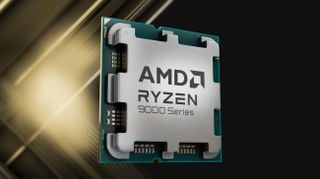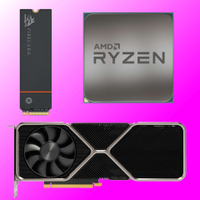AMD's spoiling Intel's Arrow Lake party with Ryzen 9000-series price cuts and the promise of 'next-gen gaming' X3D chips arriving November 7
Kicking a lump of silicon while it's down.

AMD is looking to play party pooper by today announcing an 'early holiday promotion' for its latest Zen 5 processors as well as a Ryzen 9000X3D tease, announcing the availability of its first 3D V-cache CPUs from November 7 this year.
Intel is set to launch its brand new desktop CPU platform, codenamed Arrow Lake, this week, with an October 24 release date the current expectation. And there's no doubt this reveal today is aimed squarely at kicking the rival chip maker just as it tries to stagger back to its feet with a new architecture.
But did it really need to? Intel has already fessed up to the fact that its new Core Ultra 200-series CPUs will be around 5% slower than AMD's last-gen Ryzen 7000X3D processors and that Arrow Lake will also be behind on gaming performance versus its own last-gen processors, too. Neither fact fills us with confidence about the prospect of Intel's new chips being our new go-to silicon as the best CPU for gaming, that's for sure.
AMD's new Ryzen 9000-series processors, however, haven't exactly been selling 'Tuber-endorsed soft drinks. Despite the fact they're positively fine CPUs, the release of the Zen 5 chips has been branded the "worst launch since Bulldozer" and that sales have reportedly been "disastrous".
So, it makes absolute sense for the company to both be discounting its new CPUs so soon—especially with competition arriving from Intel this week—and officially announcing its gaming-focused X3D line.
We had heard rumours of an announcement this week with availability coming in early November, but it's great to have confirmation directly from the equine's feeding hole. Still, the price cut, coming into effect today, is an added bonus.


That puts our favourite chip in the series—the Ryzen 7 9700X—at just over $300, which does make it a mighty tempting processor for anyone upgrading their system, now it's only a little more expensive than the equivalent Ryzen 7000-series chip.
And what of the X3D processors? Well, we actually know very little about what the next generation of 3D V-cache is going to look like, but AMD's Donny Wolligrowski told me at Computex this year that it wasn't just "resting on laurels" when it comes to the new implementation of the stacked cache feature.
"It's not like, hey, we've also added X3D to a chip," he tells me. "We are working actively on really cool differentiators to make it even better. We're working on X3D, we're improving it."
Which is all rather exciting, because even if AMD did just slap the same extra 64 MB of L3 cache on top of one of the CCDs we'd be looking at a great gaming CPU. Rumours are that this time around there is no reduction in clock speed for doing so—speeds were limited in the previous iterations of X3D chips—which does indeed indicate there have been changes made.
And with a launch on November 7, it's not going to be long before we find out exactly what those changes actually are and what gaming frame rates look like with the new X3D CPUs.
Best CPU for gaming: Top chips from Intel and AMD.
Best gaming motherboard: The right boards.
Best graphics card: Your perfect pixel-pusher awaits.
Best SSD for gaming: Get into the game first.

Dave has been gaming since the days of Zaxxon and Lady Bug on the Colecovision, and code books for the Commodore Vic 20 (Death Race 2000!). He built his first gaming PC at the tender age of 16, and finally finished bug-fixing the Cyrix-based system around a year later. When he dropped it out of the window. He first started writing for Official PlayStation Magazine and Xbox World many decades ago, then moved onto PC Format full-time, then PC Gamer, TechRadar, and T3 among others. Now he's back, writing about the nightmarish graphics card market, CPUs with more cores than sense, gaming laptops hotter than the sun, and SSDs more capacious than a Cybertruck.
Most Popular








